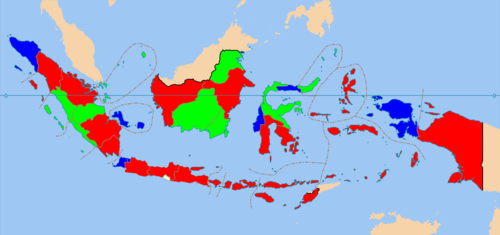
Elections in Indonesia have taken place since 1955 to elect a legislature. At a national level, Indonesian people did not elect a head of state – the president – until 2004. Since then, the president is elected for a five-year term, as are the 575-member People's Representative Council, the 136-seat Regional Representative Council, in addition to provincial and municipal legislative councils.
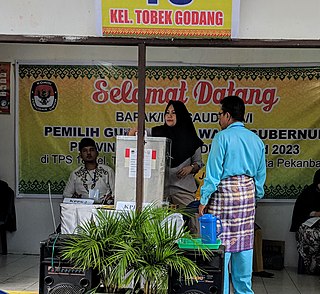
Local elections were held in Indonesia on 27 June 2018. Voters elected 17 governors, 39 mayors and 115 regents across the country. The elections included gubernatorial elections for Indonesia's four most populous provinces: West Java, East Java, Central Java and North Sumatra.

The 2018 West Java gubernatorial election took place on 27 June 2018 as part of the simultaneous local elections. It was held to elect the governor of West Java along with their deputy, whilst members of the provincial council will be re-elected in 2019.

The 2018 East Java gubernatorial election took place on 27 June 2018 as part of the simultaneous local elections. It was held to elect the governor of East Java along with their deputy, whilst members of the provincial council will be re-elected in 2019.
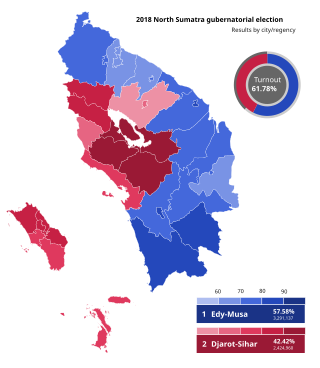
The 2018 North Sumatra gubernatorial election took place on 27 June 2018 as part of the simultaneous local elections. It was held to elect the governor of North Sumatra along with their deputy, whilst members of the provincial council will be re-elected in 2019.
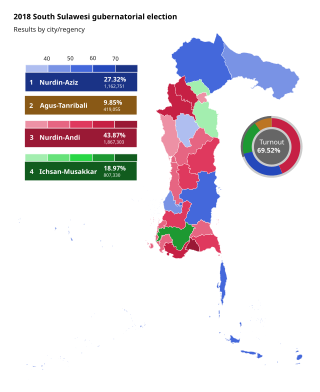
The 2018 South Sulawesi Gubernatorial Election took place on 27 June 2018 as part of the simultaneous local elections. It was held to elect the governor of South Sulawesi along with their deputy, whilst members of the provincial council will be re-elected in 2019.

The 2018 Bali gubernatorial election took place on 27 June 2018 as part of the simultaneous local elections. It was held to elect the governor of Bali along with their deputy, whilst members of the provincial council will be re-elected in 2019.

The 2018 Papua gubernatorial election took place in Papua, Indonesia on 27 June 2018 as part of the simultaneous local elections. It was held to elect the governor of Papua along with their deputy, whilst members of the provincial council will be re-elected in 2019.
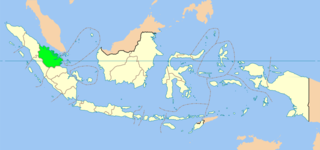
The 2018 Riau gubernatorial election took place on 27 June 2018 as part of the simultaneous local elections. It was held to elect the governor of Riau along with their deputy, whilst members of the provincial council will be re-elected in 2019.

The 2018 South Sumatra gubernatorial election took place on 27 June 2018 as part of the simultaneous local elections. It was held to elect the governor of South Sumatra along with their deputy, whilst members of the provincial council was re-elected in 2019.

The 2018 West Kalimantan gubernatorial election took place on 27 June 2018 as part of the simultaneous local elections. It was held to elect the governor of West Kalimantan along with their deputy, whilst members of the provincial council will be re-elected in 2019.

The 2018 East Kalimantan gubernatorial election took place on 27 June 2018 as part of the simultaneous local elections. It was held to elect the governor of East Kalimantan along with their deputy, whilst members of the provincial council will be re-elected in 2019.

The 2018 East Nusa Tenggara gubernatorial election took place on 27 June 2018 as part of the simultaneous local elections. It was held to elect the governor of East Nusa Tenggara along with their deputy, whilst members of the provincial council will be re-elected in 2019.

The 2018 West Nusa Tenggara gubernatorial election took place on 27 June 2018 as part of the simultaneous local elections. It was held to elect the governor of West Nusa Tenggara alongside their deputy, whilst members of the provincial council will be re-elected in 2019.

The 2018 Southeast Sulawesi gubernatorial election took place on 27 June 2018 as part of the simultaneous local elections. It was held to elect the governor of Southeast Sulawesi along with their deputy, whilst members of the provincial council will be re-elected in 2019.

Local elections were held in Indonesia on 9 December 2020. Voters elected nine governors, 224 regents, and 37 mayors across the country. All the elections were held on the same day, and over 100 million people were expected to be eligible to vote.

Hitler Nababan is an Indonesian politician from the Democratic Party who served as a member of the Karawang Regional Representative Council from 2014 until 2019.
Direct local elections were held unsimultaneously throughout Indonesia to elect governors, mayor, and regents between 2005 and 2014. In total, nearly 1,000 such elections were held within a nine-year period. Prior to 2005, local executive offices were elected by vote of members of the local Regional House of Representatives.
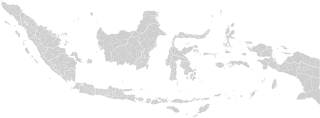
Local executive elections to elect governors, mayors and regents in Indonesia will be held on 27 November 2024 across 548 regions: 37 provinces, 415 regencies and 93 cities, which covered all provinces except Yogyakarta Special Region and all cities/regencies except the constituents of Jakarta. The previous local executive elections were held in 2020. The elections will be the first time regional leaders are all elected simultaneously nationwide in Indonesia.

In Indonesia, a Regional House of Representatives is the unicameral legislative body of an Indonesian national subdivision, at either the provincial or at the regency/city level. They are based on the amended Constitution of Indonesia, which mandated the creation of such bodies for local governance. The legislatures are present in all Indonesian provinces, and all second-level subdivisions except for the constituent municipalities of Jakarta.

